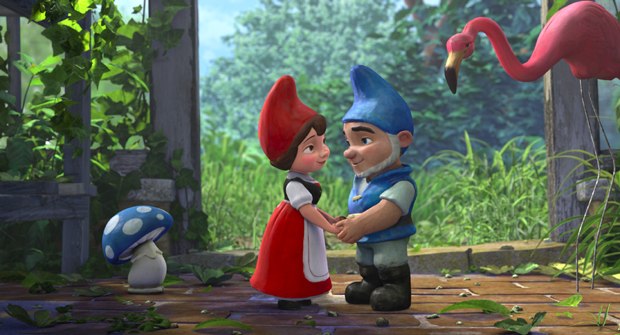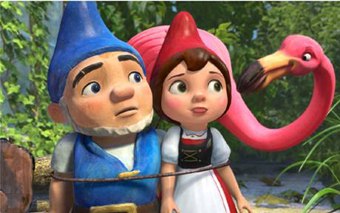Bill Desowitz reports back from Toronto and London with an exclusive preview of the first animated feature from Elton John's Rocket Pictures.
Check out the Gnomeo & Juliet trailer at AWNtv!
If Despicable Me was the surprise success of 2010 with its unique hybrid production and aesthetic model, then Gnomeo & Juliet just might pull off another "best of both worlds" success story when it opens Feb. 11, 2011.
The engaging mash-up of Shakespeare, tacky garden gnomes and the music of Elton John offers its own indie/studio hybrid. The Romeo and Juliet riff (voiced by James McAvoy and Emily Blunt) is obviously British but culturally universal; independently produced by John's Rocket Pictures, animated by Starz Animation Toronto and distributed by Touchstone Pictures; but financed by Disney and comprised of key filmmakers from the studio world, principally producer Baker Bloodworth (Pocahontas, Destino, Lorenzo) and director Kelly Asbury (Shrek 2).
But Gnomeo & Juliet didn't start out that way back in 2001, when Rocket Pictures President Steve Hamilton-Shaw optioned the spec script by Rob Sprackling and John Smith and set it up at Disney. "The movie struggled to find its tone and was not the tone of Disney animated movies," Shaw admits. "It was always a bit of a square peg into a round hole."
Indeed, when Pixar took over Disney Feature Animation in 2006, John Lasseter passed on Gnomeo & Juliet when directors Aaron Blaise and Bob Walker were less than passionate about the project and wanted to helm something else instead. However, studio chief Dick Cook wanted to stay in business with John and his Rocket partner David Furnish, so he set it up at Disney-owned Miramax Films with President Daniel Battsek.
"The film has a unique sensibility because it really has to celebrate the ironic tone of the concept," adds Furnish, who, along with Shaw, produced for Rocket. "It's the high-art of William Shakespeare and the low-art of the garden gnome and it's the contrasting of those two which makes the whole notion of the film very funny. And we struggled initially with people at Disney because they couldn't grasp the low art of the garden gnome. I think in the end to make the film in the independent style that we did allowed us to cast the team appropriately -- to get Baker, to get Kelly working with my partner Steve, and to do all the production development and design in [London] because it is a British concept, at the end of the day. So much of British humor is rooted in irony. And we felt it was important to get the story team and design team London based before we started animating to really soak themselves up in British culture. I'm particularly proud of the accuracy of the sort of middle Britain town that appears in the film (Stratford-upon-Avon). That's not necessarily the view of Britain that people around the world have."
Shaw admits that doing the film independent of the Disney brand definitely helped "find its own merits" and kept it under the radar. "Which was another interesting thing about the way we made it," Shaw suggests. "Whilst we always had the studio involved, because we were somewhere else, we had our own little culture going. In a strange way, that left us more to our devises; the challenge was to make it more efficient but still reach that very high level of quality."
That rested with Bloodworth, who came aboard early on and nurtured the project first at Disney, then in London, enticing Asbury to direct and Karen deJong (The Lord of the Rings: The Return of the King) to art direct and finally finding a home at Starz in Toronto (Furnish's home town) after London proved too costly to do the animation.
"We selected Starz (which had just done 9) for all the big reasons: they were available and for the right price; they had talent; and they had enough bandwidth," Bloodworth explains. "And for the financial reasons, it was a huge incentive to go there (40% back on the dollar and so you could put a lot more on the screen for about half of what a studio animated feature costs)."
But even greater talent and leadership were required to grow the studio. Igor Khait (Everyone's Hero) was hired to help the Starz management team, which includes David Steinberg, head of studio; Terry Dale, head of operations and training; Rob Burton, head of technology; and Matt Teevan, head of production. And they brought in Henry Anderson (Stuart Little) to supervise animation, Xavier Bernasconi (The Tale of Despereaux ) to supervise lighting, Freddy Chaleur (Mickey's Twice Upon a Christmas) to supervise surfacing and Corey Smith (Meet the Robinsons) to supervise effects.
For Asbury, it was the right project at the right time: "I've always loved the incongruous, so I was drawn to Shakespeare, garden gnomes and Elton John coming together," the director says. "I started thinking there's a very intriguing, funny opportunity here. How can you make all that work together? It really was a challenge. Baker and Steve Hamilton-Shaw and David Furnish and Igor Khait really facilitated my getting the movie the way I wanted it. We tried to do it as traditionally as we could in a very non-traditional way of working. In a way, I got my first taste of what it might be like to make an independent animated film. We had the support of the studio, and Pam Coats, who was formerly at Disney, was brought in to liaise as the bridge between animation and those people in live action who had never done animation before. Luckily, people at Miramax were quick learners and they trusted us. The only problem we had is that those people kept getting fired. Just when you'd get one person on your side, you'd have to get someone new on your side. It was a constant tap dance.
"The thing about Starz that is so great is that they were really ready to give us what we were asking for. I think it's got a richness and depth and sense of reality to it and I think we made it for what it should cost; Starz found ways to make it appear more expensive than it really is: The gardens required simulation and the characters required rigging, modeling and ceramic surfacing. Lighting and rendering. They needed to build the pipeline and have the talent to pull it off technically and on schedule and on budget. I wanted from the beginning that the movie needed to look as realistic as we could get it so the audience would believe these garden gnomes could come to life."
Asbury says the movie suddenly came together when McAvoy adlibbed a line during a crucial exchange with Shakespeare (voiced by Patrick Stewart) about the inevitability of his fate: "You're telling me, it's a tragedy -- it's rubbish!"
"I don't know what ingredient that added except it made us say, 'Let's just be a parody of Shakespeare -- let's not hide from it,'" Asbury adds. "At the same time, we wanted to remain sincere so the audience still cares. I hope we've done that."
Meanwhile, other than opening with "Saturday Night's Alright for Fighting" during a lawn mower race and a cover version later on of "Crocodile Rock" by Nelly Furtado, the use of John's iconic music is merely hinted at in the score by old pal James Newton Howard.
"When the film was greenlit, we wanted Elton to be one of the cornerstones of the film," Furnish suggests. "Elton has written such an extensive amount of music that has touched so many people's lives… there's a lot of emotional wealth in those melodies. They take you to places right away, even on a subconscious level. So when you evoke 'Your Song' during some of the more romantic moments in the film, you get all of that wealth of history and awareness with it; when you get the 'Tiny Dancer' riff for Juliet and the 'Rocket Man' riff for Gnomeo, again, they are just chock full of good associations and memories for people and a huge likability factor."
As for the two new songs written with long-time lyricist Bernie Taupin, "Hello Hello" (sung by John and Lady Gaga) was conceived for the love at first sight moment between Gnomeo and Juliet, while "Love Builds a Garden" was conceived when they meet the flamingo character, Featherstone (voiced by Jim Cummings), "who's been locked up for 20 years and has been a victim of love going out of someone's life and realizing that it's a very precious, very beautiful thing that should be treasured," according to Furnish.
"There is something for everyone and it's timeless in expressing how we continue to live in a divided and conflicted world," Furnish adds. "Elton and I are great advocates of a world brought together. As Elton always says -- and I think it's one of the reasons he endures today -- 'Life is about building bridges, not walls.'"
Bill Desowitz is senior editor of AWN & VFXWorld.











